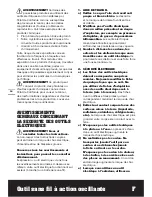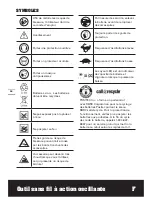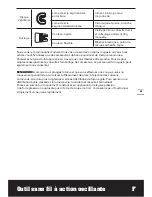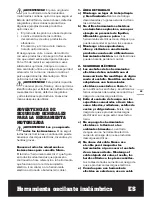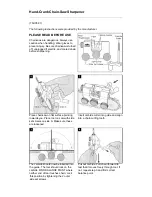
Cordless Oscillating Tool
EN
10
OPERATING INSTRUCTIONS
NOTE:
Before using the tool, read the
instruction book carefully.
INTENDED USE:
The power tool is intended for sawing and
remodeling wooden materials, plastic,
plaster, non-ferrous metals and fasteners (e.g.
nails and clamps) as well as for working on
soft wall tiles and for dry grinding of small
surfaces. It is especially suitable for working
close to edges and for flush cutting.
ASSEMBLY AND OPERATION
Action
Figure
Mounting Accessories
See Fig. A1-A4
Mounting The Sanding
Sheet
See Fig. B
Operating The On/Off
Switch
See Fig. C
Using The Variable Speed
Dial
See Fig. D
Remove Or Install Battery
Pack
See Fig. E
LED Light
See Fig. F
The Variable Speed Dial can be used to set
the optimum oscillating frequency according
to the accessories used and the respective
application.
Oscillation
frequency
Application
High oscillation
frequency:
Sanding, sawing,
rasping and polishing
stone and metal.
Low oscillation
frequency:
Scraping, polishing
varnishes.
DISPOSAL OF AN
EXHAUSTED BATTERY PACK
To preserve natural resources, please
recycle or dispose of the battery pack
properly. This battery pack contains
Lithium batteries. Consult your local waste
authority for information regarding available
recycling and/or disposal options. Discharge
your battery pack by operating your drill, then
remove the battery pack from the drill housing
and cover the battery pack connections with
heavy-duty adhesive tape to prevent short
circuit and energy discharge. Do not attempt to
open or remove any of the components.
WORKING HINTS FOR YOUR
TOOL
If your power tool becomes too hot, especially
when used at low speed, set the speed to
maximum and run it with no load for 2-3
minutes to cool the motor. Avoid prolonged
usage at very low speeds. Always keep the
blade sharp.
Always ensure the workpiece is firmly held or
clamped to prevent movement.
Any movement of the material may affect the
quality of the cutting or sanding finish.
Start your tool before working and turn it off
only after you stop working.
Do not start sanding without having the
sandpaper fitted.
Do not allow the sandpaper to wear away , it
will damage the sanding pad. The guarantee
does not cover sanding pad wear and tear.
Use coarse grit paper to sand rough surfaces,
medium grit for smooth surfaces and fine grit
for finishing surfaces. If necessary, first make a
test run on scrap material.
Excessive force will reduce the working
efficiency and cause motor overload. Replacing
the accessory regularly will maintain optimum
working efficiency.














